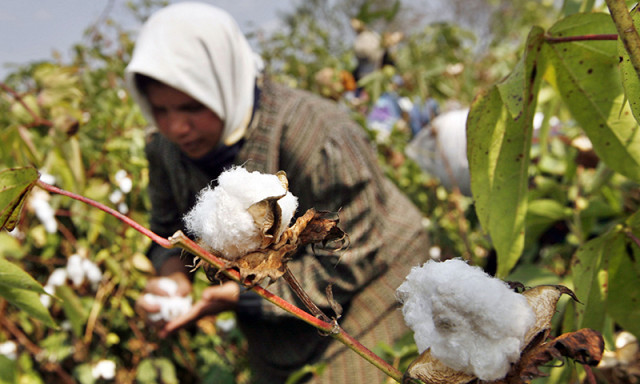Parliament’s nod must for slapping tax: PHC
Links PM, cabinet’s taxation powers with legislature’s approval

In this photo, a farmer collects cotton harvest at a farm. PHOTO: AFP
A PHC division bench comprising Justice Waqar Ahmad Seth and Justice Ghazanfar Ali passed the order while hearing six petitions filed by the K-P zone of All Pakistan Textile Mills Association through their attorney Qazi Ghulam Dastagir.
Arguing before the bench, Dastagir said under Section 3 of Cotton Cess Act 1913 the cess could apply only if the raw materials were produced in the country. “As the raw materials are being imported, the cess cannot be imposed under the law,” he said.
Citing the Cotton Rules 1950, the counsel said the tax could be imposed in cases where there was an increase in production of cotton and government had enough quantity that could meet local need while leaving stock for export.
He said such tax could not be imposed on cotton bales imported from different countries under the act. Dastagir contended that in 2012 the then prime minister amended Cotton Rules 1950 and imposed tax on import of cotton worth Rs100 per bale but left section 3 untouched.
“No amendment in section 3 of the Act renders the recovery of cotton cess illegal,” he argued.
Citing a judgment of the apex court, he said the Supreme Court of Pakistan has recently ruled that the prime minister could not impose any kind of tax without approval of parliament, making it biding on the PM to get approval from parliament for amending the existing laws if he wanted to impose taxes.
“Besides, the revenue generated through cotton cess is being spent on cotton research which has become a provincial subject after the 18th Amendment,” he argued. He contended that Central Cotton Committee and Cotton Research Institution did not exist in the K-P and therefore recovery of tax was illegal and unconstitutional.
Attorney representing the Directorate of Cotton Cess and Central Cotton Committee argued that the exemption given to traders under Section 3 of the Act has been withdrawn after which the tax was imposed throughout the country.
Justice Seth asked the attorney if there was any law that was amended only by the PM without the approval of parliament and imposed new taxes. The judge asked how the federal government could recover cess when research on cotton was devolved to provinces after the 18th Amendment.
After hearing arguments of both parties, the PHC bench declared the federal government’s decision to recover cotton cess as null and void.
Published in The Express Tribune, March 2nd, 2017.












COMMENTS
Comments are moderated and generally will be posted if they are on-topic and not abusive.
For more information, please see our Comments FAQ